Sambalpur: The Hirakud Reservoir and its surrounding wetlands in Odisha have been found to contain high levels of toxic pollutants, including cancer-causing heavy metals. A recent survey conducted by prominent national research institutions and universities revealed that industrial waste dumped into the reservoir has severely polluted the water and soil, sparking grave concerns among local residents, environmentalists, and farmers. The reservoir, which serves as a primary source of water for irrigation, power generation, and even drinking, is now seen as a potential health hazard.
Statewide Study Exposes Toxicity in Odisha Wetlands
The findings were published in a 2023 scientific report published by Nature.com titled "Assessment of Environmental and Carcinogenic Health Hazards From Heavy Metal Contamination in Sediments of Wetlands" based on a study across eight major wetland areas in Odisha, including Hirakud, Titilagarh, Koraput, Daringbadi, Chilika, Chandenshwar, Talcher, and Bhadrak. Samples from these areas revealed alarming concentrations of heavy metals such as lead, chromium, cadmium, copper, mercury, nickel, zinc, manganese, and arsenic embedded in the soil. Researchers warn that these pollutants can leach into crops grown in the contaminated soil, entering the food chain and posing a direct threat to human health.
Minister Acknowledges Pollution Crisis, Promises Action
Odisha’s Minister for Revenue and Disaster Management, Suresh Pujari, expressed his concerns recently while visiting the Samaleswari temple here. Aware of the study’s findings, Pujari acknowledged the risks posed by toxic metal contamination in the Hirakud Dam’s waters and pledged a comprehensive review. “I have discussed the report with officials, and we are evaluating the situation in partnership with various agencies,” he stated. “This contamination from industrial pollutants is harmful to human health, and I have requested a thorough investigation into the extent of the damage.”
The minister announced plans for an upcoming high-level meeting involving district officials from Sambalpur, Bargarh, Jharsuguda, Sundargarh, and Angul, as well as the Pollution Control Board and Uttarakhand-RDC, to address pollution control measures. Guidelines to curb both air and water pollution from nearby industries are expected to be issued following the meeting.
Industrial Waste Linked to Reservoir Contamination
